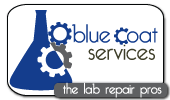One of the first things most people learn about when they get into a field requiring lab work is how to keep themselves safe. Whether you’re a medical student or work in a chemistry laboratory, potential hazards are always present. While being aware of dangers in the lab might seem like preparation enough, there truly is no such thing as being “too safe”. Likewise, no amount of acting safely can discount the need for the proper safety equipment while handling dangerous materials. If a member of your team refuses to protect themselves they are doing more than putting their own well-being at risk – they are also diminishing the productivity of the entire group. Not everyone is going to be equally educated in lab safety, but the following information can be understood and helpful to anyone.
Use Appropriate Equipment
Your body is more fragile than you would initially think. Thousands of laboratory accidents are reported annually, some of which involving severe bodily harm. It’s for this reason that trained professionals work tirelessly to create and test the best lab safety gear. Safety Goggles, for example, should be located in every lab you find yourself in. The plastic, wide frame design is perfectly suited for keeping hazardous materials from entering your eyes, while still providing the ability to see. Safety goggles should be worn whenever you’re handling liquid, vapors, smoke, or materials that may produce sparks.
Thick plastic gloves are often found in labs, as it is difficult to avoid working with your hands. Ensure that you wash your hands before and after putting the gloves on, and that you have the appropriate gloves for what you will be doing. There are many differences between heat resistant gloves and powdered gloves; know which job calls for each kind of hand gear! Also, do not forget your protective apron or lab jacket! Spilling chemicals or blood on one’s person is a very common accident, and can happen to anybody. Tying a single knot or snapping a few buttons could save not only your clothing, but your life.
Work as a Group
If you are working in a laboratory there’s a strong chance that you’re doing so with others. Research and practice should be a group experience whenever possible. Not only does it help produce clearer, more accurate results, but working alone can be dangerous. If something happens to you while in the lab alone, the chances that you will receive the help you need are drastically reduced. Having a partner means having someone else to gauge your own safety. Also, ensure that your coworkers understand that looking and listening to what others are doing is just as integral to safety and paying attention to their own work. Bumping into another person could lead to dropped glass, spilled liquids, or falling hazards. Remember, communication is one of the best tools in any work environment!

